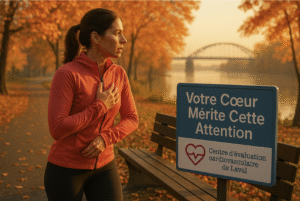Being active every day has countless benefits. It keeps you fit for longer, keeps your mind more alert and helps prevent many illnesses.
In fact, physical activity is one of the most important factors in staying healthy.
Even a moderate amount of exercise can have a profound impact on your overall well-being! 🙌🏻
Being active doesn't have to mean going to the gym or running a marathon. Even small changes in your daily routine can make a big difference.
For example, taking the stairs instead of the elevator, walking or biking to work, or even playing with your children or pets in the park can all help increase your daily activity level.
What are the benefits of physical activity?
Whatever your fitness goals, remember that even a little activity can go a long way.
However, before any physical activity sessions, consult your doctor if you have any restrictions that depend on the progress of any illness.
Physical activity has countless benefits. It can help improve mental health, extend lifespan and protect against chronic diseases.
Studies have shown that regular exercise reduces the risk of developing diseases such as obesity, heart disease, stroke, diabetes and cancer.
In addition, it can improve mood, cognitive function and memory. Exercise also releases endorphins, which have beneficial effects on mood. 😌
Otherwise, physical activity helps to strengthen bones and muscles, improve balance and coordination, and increase flexibility. All in all, there are few downsides to being physically active!
Here's a list of things you can do to get moving every day:
- Improved health cardiac (exercise and functional capacity)
- Lower systolic blood pressure
- Weight maintenance or slight loss
- Regulation of blood sugar levels
- Regulation of blood lipid levels
- Improved endurance, muscular strength and flexibility
- Reduced fatigue, increased energy and concentration, reduced stress
- Osteoporosis prevention
- Preventing cognitive decline
- Prevent chronic diseases such as cancer and type 2 diabetes

The benefits of physical activity for adults and seniors elderly
For adults and the elderly in particular, physical activity can help counteract the natural decline in muscle mass and bone density that occurs with age.
In addition, research has shown that regular exercise can help improve cognitive function and reduce the risk of dementia. 😮
In short, there are many reasons why adults and seniors should make physical activity a priority.
Here's a quick summary of the benefits:
- Slows the development of atherosclerosis, a degenerative disease of the blood vessels;
- Reduces the risk of complications after a heart attack;
- Delays the onset of hypertension (high blood pressure);
- Helps reduce arthritis symptoms;
- Increases bone strength;
- Helps maintain good muscle mass;
- Develops sense of balance, which reduces the risk of falling and helps prevent fractures;
- Helps you stay independent longer.
However, it is important to consult your doctor if you have cardiovascular, respiratory or joint diseases. ⚠️
Cardiomyopathy and high blood pressure can prohibit or even limit the practice of physical activities.
What sporting activity should you choose for good cardiovascular health?
When it comes to choosing an activity to help you get fit, there are plenty of options available. But with so many to choose from, it can be hard to know where to start.
That's why it's important to remember that you don't have to choose an activity you hate just because it's good for you.
Why not choose a sport you really enjoy instead? Not only will you be more likely to stick with it in the long term, but you might even get hooked on a new hobby.
And if you don't know where to start, walking is always a great option.
It's free, easy to do and good for your health. Plus, if you need extra motivation, finding a walking partner can be a great way to stay on track.
Interval training
Interval training is a great way to maximize your cardiovascular gains, whether you're cycling, swimming or walking.
Interval training, which alternates between periods of high and low intensity, has been shown to have considerable health benefits, including better cardiovascular fitness and increased caloric expenditure.
What's more, interval training seems easier, less monotonous and more enjoyable than continuous training. 🏊🏻♀️
This is because interval training takes advantage of the body's natural tendency to fluctuate between periods of high and low activity.
By alternating periods of high and low intensity, interval training tricks the body into thinking it's not working as hard as it really is.
As a result, interval training is a more efficient way to train and can help avoid boredom. To do this, simply perform short bursts of 30 seconds of speed, followed by 30 seconds of rest. Repeat this sequence for 8 minutes.
Then pause for 2-3 minutes and finish with a second block identical to the first.
This type of training is excellent because it challenges your body in a new way and forces your heart to work harder. You'll notice an improvement in your cardiovascular fitness in no time!
Aerobic exercise
Aerobic exercise is any activity that raises your heart rate and maintains it over a period of time. 🏃🏻
These include activities such as walking, running, cycling, swimming or dancing. When practised regularly, aerobic exercise has a number of benefits for the health and well-being of the body. heart health.
For example, it can help reduce blood pressure and cholesterol levels. It can also help prevent heart disease and other cardiovascular problems.
In fact, aerobic exercise is considered to be the best type of exercise for the heart. It not only strengthens the heart muscle, but also improves the functioning of the entire cardiovascular system.
If you're looking to improve the health of your heartStart adding aerobic exercise to your routine.
Endurance exercises
When most people think of resistance exercise, they imagine athletes lifting heavy weights in a gym. 💪🏻
However, resistance exercise can actually encompass a wide range of activities. For example, using elastic bands to provide resistance during exercise is a form of resistance exercise.
Similarly, exercises that rely on the resistance of your own body weight, such as push-ups or pull-ups, are also considered resistance exercises.
The heart is a muscle, and like all muscles, it benefits from regular exercise. Endurance exercise, in particular, can help keep the heart healthy by reducing the risk of heart disease.
Endurance exercises make the heart work harder, which strengthens the muscle and makes it more efficient.
As a result, the heart doesn't need to beat as hard or as fast to pump blood through the body. This can help reduce blood pressure and improve circulation. 🩸
Don't forget to listen to your body!
While exercise has many benefits, it's important to make sure you're doing it correctly to avoid injury. One way to know if you're doing an exercise correctly is to listen to your body.
For example, if you feel a sharp pain, it's a sign that you need to stop. 🥵
Similarly, if you feel dizzy or lightheaded, these are also signs that you need to take a break.
However, it's important to note that some discomfort is normal when you're doing everyday activities.
Ultimately, the best way to know if you're exercising correctly is to pay attention to how your body feels and listen to the warning signals it may give you.
You need a evaluation before you start playing sports on a regular basis?
Book an appointment at one of our centers in Laval, Mascouche and Vaudreuil-Dorion.
Sources :
Government of Quebec. "Améliorer sa santé grâce à l'activité physique". n.d. Online. https://www.quebec.ca/sante/conseils-et-prevention/saines-habitudes-de-vie/activite-physique/ameliorer-sa-sante-grace-a-lactivite-physique (page consulted on November 14, 2022).
Montreal Heart Institute. "Physical activity. n.d. Online. https://www.icm-mhi.org/fr/prevention/adopter-de-saines-habitudes-de-vie/activite-physique
Heart + stroke. "Keeping fit despite heart disease". n.d. Online. https://www.coeuretavc.ca/articles/exercising-when-you-have-heart-disease (page consulted on November 14, 2022).





